Psychology of Healthcare Management: Stress Causes, Impact & Solutions
VerifiedAdded on 2023/06/08
|12
|5129
|137
Report
AI Summary
This report delves into the psychology of healthcare management, specifically examining the causes and impact of workplace stress on healthcare professionals. It highlights how continuous work and the demanding nature of healthcare roles contribute to stress, affecting both the well-being of professionals and the quality of service delivery. The report discusses various stressors, including high workloads and lack of support, and their consequences, such as reduced productivity and compromised patient care. Furthermore, it emphasizes the responsibilities of employers in managing stress through strategies like training, job rotation, and creating a supportive work environment. Effective stress management is crucial for improving healthcare outcomes, enhancing organizational productivity, and ensuring the well-being of healthcare staff. Desklib provides similar assignments and study tools for students.
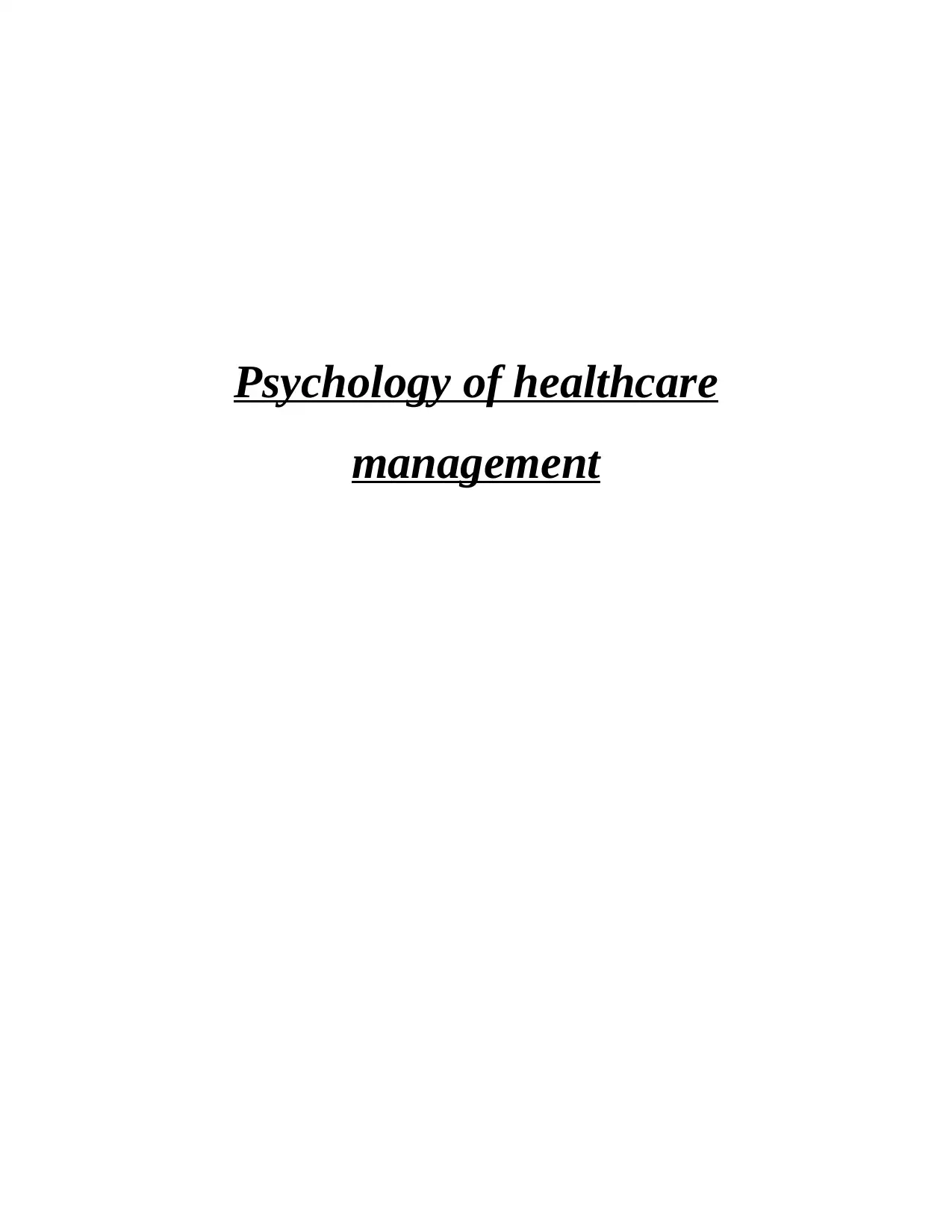
Psychology of healthcare
management
management
Paraphrase This Document
Need a fresh take? Get an instant paraphrase of this document with our AI Paraphraser
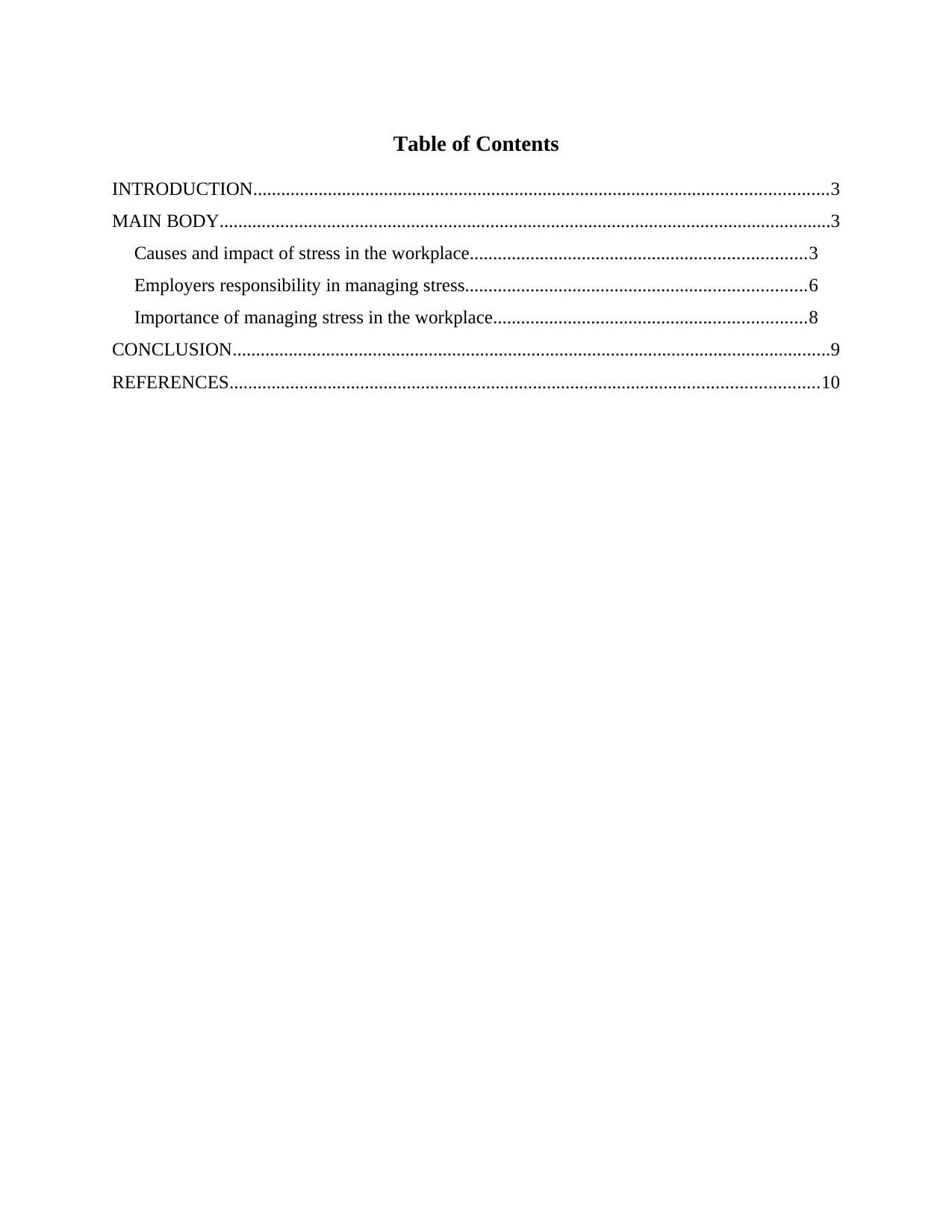
Table of Contents
INTRODUCTION...........................................................................................................................3
MAIN BODY...................................................................................................................................3
Causes and impact of stress in the workplace........................................................................3
Employers responsibility in managing stress.........................................................................6
Importance of managing stress in the workplace...................................................................8
CONCLUSION................................................................................................................................9
REFERENCES..............................................................................................................................10
INTRODUCTION...........................................................................................................................3
MAIN BODY...................................................................................................................................3
Causes and impact of stress in the workplace........................................................................3
Employers responsibility in managing stress.........................................................................6
Importance of managing stress in the workplace...................................................................8
CONCLUSION................................................................................................................................9
REFERENCES..............................................................................................................................10
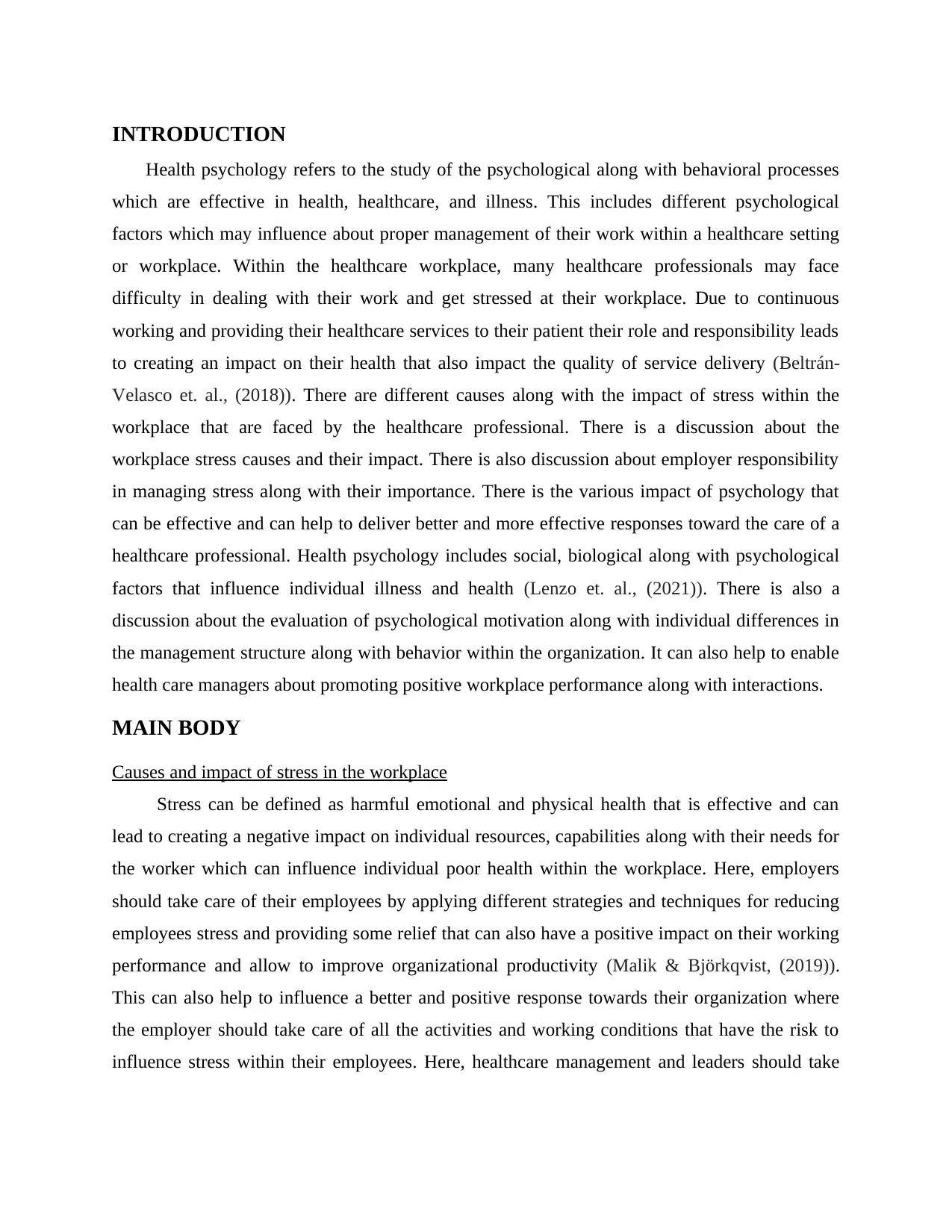
INTRODUCTION
Health psychology refers to the study of the psychological along with behavioral processes
which are effective in health, healthcare, and illness. This includes different psychological
factors which may influence about proper management of their work within a healthcare setting
or workplace. Within the healthcare workplace, many healthcare professionals may face
difficulty in dealing with their work and get stressed at their workplace. Due to continuous
working and providing their healthcare services to their patient their role and responsibility leads
to creating an impact on their health that also impact the quality of service delivery (Beltrán-
Velasco et. al., (2018)). There are different causes along with the impact of stress within the
workplace that are faced by the healthcare professional. There is a discussion about the
workplace stress causes and their impact. There is also discussion about employer responsibility
in managing stress along with their importance. There is the various impact of psychology that
can be effective and can help to deliver better and more effective responses toward the care of a
healthcare professional. Health psychology includes social, biological along with psychological
factors that influence individual illness and health (Lenzo et. al., (2021)). There is also a
discussion about the evaluation of psychological motivation along with individual differences in
the management structure along with behavior within the organization. It can also help to enable
health care managers about promoting positive workplace performance along with interactions.
MAIN BODY
Causes and impact of stress in the workplace
Stress can be defined as harmful emotional and physical health that is effective and can
lead to creating a negative impact on individual resources, capabilities along with their needs for
the worker which can influence individual poor health within the workplace. Here, employers
should take care of their employees by applying different strategies and techniques for reducing
employees stress and providing some relief that can also have a positive impact on their working
performance and allow to improve organizational productivity (Malik & Björkqvist, (2019)).
This can also help to influence a better and positive response towards their organization where
the employer should take care of all the activities and working conditions that have the risk to
influence stress within their employees. Here, healthcare management and leaders should take
Health psychology refers to the study of the psychological along with behavioral processes
which are effective in health, healthcare, and illness. This includes different psychological
factors which may influence about proper management of their work within a healthcare setting
or workplace. Within the healthcare workplace, many healthcare professionals may face
difficulty in dealing with their work and get stressed at their workplace. Due to continuous
working and providing their healthcare services to their patient their role and responsibility leads
to creating an impact on their health that also impact the quality of service delivery (Beltrán-
Velasco et. al., (2018)). There are different causes along with the impact of stress within the
workplace that are faced by the healthcare professional. There is a discussion about the
workplace stress causes and their impact. There is also discussion about employer responsibility
in managing stress along with their importance. There is the various impact of psychology that
can be effective and can help to deliver better and more effective responses toward the care of a
healthcare professional. Health psychology includes social, biological along with psychological
factors that influence individual illness and health (Lenzo et. al., (2021)). There is also a
discussion about the evaluation of psychological motivation along with individual differences in
the management structure along with behavior within the organization. It can also help to enable
health care managers about promoting positive workplace performance along with interactions.
MAIN BODY
Causes and impact of stress in the workplace
Stress can be defined as harmful emotional and physical health that is effective and can
lead to creating a negative impact on individual resources, capabilities along with their needs for
the worker which can influence individual poor health within the workplace. Here, employers
should take care of their employees by applying different strategies and techniques for reducing
employees stress and providing some relief that can also have a positive impact on their working
performance and allow to improve organizational productivity (Malik & Björkqvist, (2019)).
This can also help to influence a better and positive response towards their organization where
the employer should take care of all the activities and working conditions that have the risk to
influence stress within their employees. Here, healthcare management and leaders should take
⊘ This is a preview!⊘
Do you want full access?
Subscribe today to unlock all pages.

Trusted by 1+ million students worldwide
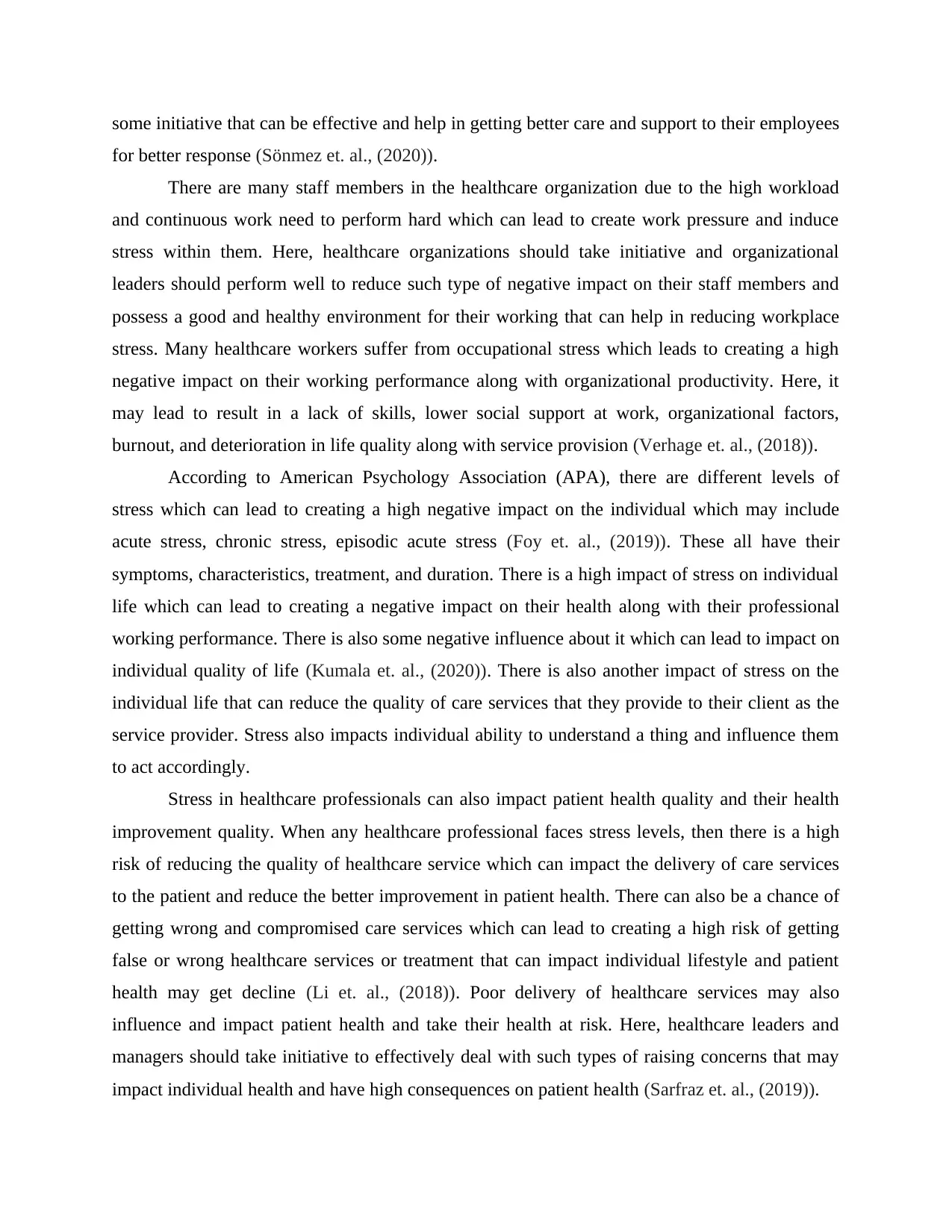
some initiative that can be effective and help in getting better care and support to their employees
for better response (Sönmez et. al., (2020)).
There are many staff members in the healthcare organization due to the high workload
and continuous work need to perform hard which can lead to create work pressure and induce
stress within them. Here, healthcare organizations should take initiative and organizational
leaders should perform well to reduce such type of negative impact on their staff members and
possess a good and healthy environment for their working that can help in reducing workplace
stress. Many healthcare workers suffer from occupational stress which leads to creating a high
negative impact on their working performance along with organizational productivity. Here, it
may lead to result in a lack of skills, lower social support at work, organizational factors,
burnout, and deterioration in life quality along with service provision (Verhage et. al., (2018)).
According to American Psychology Association (APA), there are different levels of
stress which can lead to creating a high negative impact on the individual which may include
acute stress, chronic stress, episodic acute stress (Foy et. al., (2019)). These all have their
symptoms, characteristics, treatment, and duration. There is a high impact of stress on individual
life which can lead to creating a negative impact on their health along with their professional
working performance. There is also some negative influence about it which can lead to impact on
individual quality of life (Kumala et. al., (2020)). There is also another impact of stress on the
individual life that can reduce the quality of care services that they provide to their client as the
service provider. Stress also impacts individual ability to understand a thing and influence them
to act accordingly.
Stress in healthcare professionals can also impact patient health quality and their health
improvement quality. When any healthcare professional faces stress levels, then there is a high
risk of reducing the quality of healthcare service which can impact the delivery of care services
to the patient and reduce the better improvement in patient health. There can also be a chance of
getting wrong and compromised care services which can lead to creating a high risk of getting
false or wrong healthcare services or treatment that can impact individual lifestyle and patient
health may get decline (Li et. al., (2018)). Poor delivery of healthcare services may also
influence and impact patient health and take their health at risk. Here, healthcare leaders and
managers should take initiative to effectively deal with such types of raising concerns that may
impact individual health and have high consequences on patient health (Sarfraz et. al., (2019)).
for better response (Sönmez et. al., (2020)).
There are many staff members in the healthcare organization due to the high workload
and continuous work need to perform hard which can lead to create work pressure and induce
stress within them. Here, healthcare organizations should take initiative and organizational
leaders should perform well to reduce such type of negative impact on their staff members and
possess a good and healthy environment for their working that can help in reducing workplace
stress. Many healthcare workers suffer from occupational stress which leads to creating a high
negative impact on their working performance along with organizational productivity. Here, it
may lead to result in a lack of skills, lower social support at work, organizational factors,
burnout, and deterioration in life quality along with service provision (Verhage et. al., (2018)).
According to American Psychology Association (APA), there are different levels of
stress which can lead to creating a high negative impact on the individual which may include
acute stress, chronic stress, episodic acute stress (Foy et. al., (2019)). These all have their
symptoms, characteristics, treatment, and duration. There is a high impact of stress on individual
life which can lead to creating a negative impact on their health along with their professional
working performance. There is also some negative influence about it which can lead to impact on
individual quality of life (Kumala et. al., (2020)). There is also another impact of stress on the
individual life that can reduce the quality of care services that they provide to their client as the
service provider. Stress also impacts individual ability to understand a thing and influence them
to act accordingly.
Stress in healthcare professionals can also impact patient health quality and their health
improvement quality. When any healthcare professional faces stress levels, then there is a high
risk of reducing the quality of healthcare service which can impact the delivery of care services
to the patient and reduce the better improvement in patient health. There can also be a chance of
getting wrong and compromised care services which can lead to creating a high risk of getting
false or wrong healthcare services or treatment that can impact individual lifestyle and patient
health may get decline (Li et. al., (2018)). Poor delivery of healthcare services may also
influence and impact patient health and take their health at risk. Here, healthcare leaders and
managers should take initiative to effectively deal with such types of raising concerns that may
impact individual health and have high consequences on patient health (Sarfraz et. al., (2019)).
Paraphrase This Document
Need a fresh take? Get an instant paraphrase of this document with our AI Paraphraser
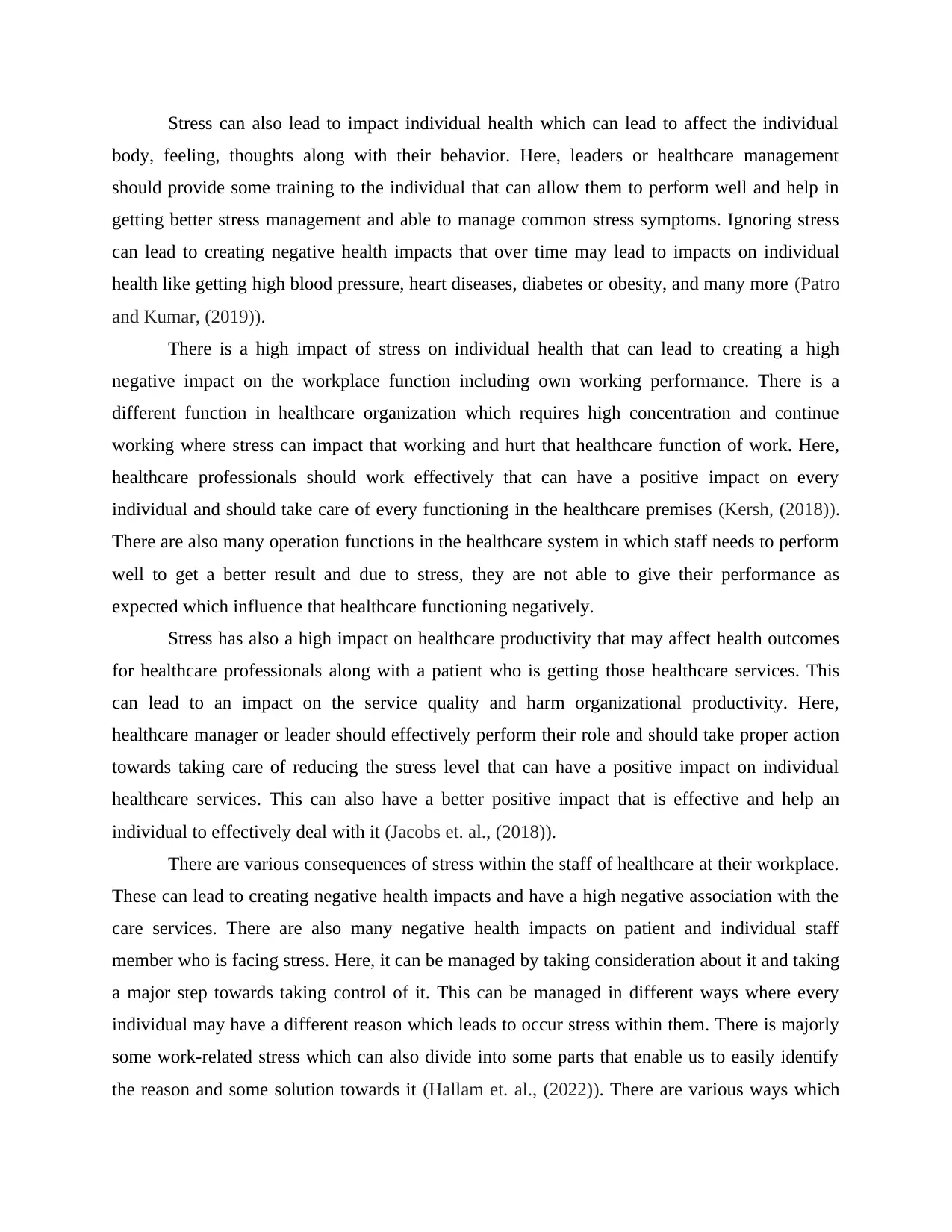
Stress can also lead to impact individual health which can lead to affect the individual
body, feeling, thoughts along with their behavior. Here, leaders or healthcare management
should provide some training to the individual that can allow them to perform well and help in
getting better stress management and able to manage common stress symptoms. Ignoring stress
can lead to creating negative health impacts that over time may lead to impacts on individual
health like getting high blood pressure, heart diseases, diabetes or obesity, and many more (Patro
and Kumar, (2019)).
There is a high impact of stress on individual health that can lead to creating a high
negative impact on the workplace function including own working performance. There is a
different function in healthcare organization which requires high concentration and continue
working where stress can impact that working and hurt that healthcare function of work. Here,
healthcare professionals should work effectively that can have a positive impact on every
individual and should take care of every functioning in the healthcare premises (Kersh, (2018)).
There are also many operation functions in the healthcare system in which staff needs to perform
well to get a better result and due to stress, they are not able to give their performance as
expected which influence that healthcare functioning negatively.
Stress has also a high impact on healthcare productivity that may affect health outcomes
for healthcare professionals along with a patient who is getting those healthcare services. This
can lead to an impact on the service quality and harm organizational productivity. Here,
healthcare manager or leader should effectively perform their role and should take proper action
towards taking care of reducing the stress level that can have a positive impact on individual
healthcare services. This can also have a better positive impact that is effective and help an
individual to effectively deal with it (Jacobs et. al., (2018)).
There are various consequences of stress within the staff of healthcare at their workplace.
These can lead to creating negative health impacts and have a high negative association with the
care services. There are also many negative health impacts on patient and individual staff
member who is facing stress. Here, it can be managed by taking consideration about it and taking
a major step towards taking control of it. This can be managed in different ways where every
individual may have a different reason which leads to occur stress within them. There is majorly
some work-related stress which can also divide into some parts that enable us to easily identify
the reason and some solution towards it (Hallam et. al., (2022)). There are various ways which
body, feeling, thoughts along with their behavior. Here, leaders or healthcare management
should provide some training to the individual that can allow them to perform well and help in
getting better stress management and able to manage common stress symptoms. Ignoring stress
can lead to creating negative health impacts that over time may lead to impacts on individual
health like getting high blood pressure, heart diseases, diabetes or obesity, and many more (Patro
and Kumar, (2019)).
There is a high impact of stress on individual health that can lead to creating a high
negative impact on the workplace function including own working performance. There is a
different function in healthcare organization which requires high concentration and continue
working where stress can impact that working and hurt that healthcare function of work. Here,
healthcare professionals should work effectively that can have a positive impact on every
individual and should take care of every functioning in the healthcare premises (Kersh, (2018)).
There are also many operation functions in the healthcare system in which staff needs to perform
well to get a better result and due to stress, they are not able to give their performance as
expected which influence that healthcare functioning negatively.
Stress has also a high impact on healthcare productivity that may affect health outcomes
for healthcare professionals along with a patient who is getting those healthcare services. This
can lead to an impact on the service quality and harm organizational productivity. Here,
healthcare manager or leader should effectively perform their role and should take proper action
towards taking care of reducing the stress level that can have a positive impact on individual
healthcare services. This can also have a better positive impact that is effective and help an
individual to effectively deal with it (Jacobs et. al., (2018)).
There are various consequences of stress within the staff of healthcare at their workplace.
These can lead to creating negative health impacts and have a high negative association with the
care services. There are also many negative health impacts on patient and individual staff
member who is facing stress. Here, it can be managed by taking consideration about it and taking
a major step towards taking control of it. This can be managed in different ways where every
individual may have a different reason which leads to occur stress within them. There is majorly
some work-related stress which can also divide into some parts that enable us to easily identify
the reason and some solution towards it (Hallam et. al., (2022)). There are various ways which
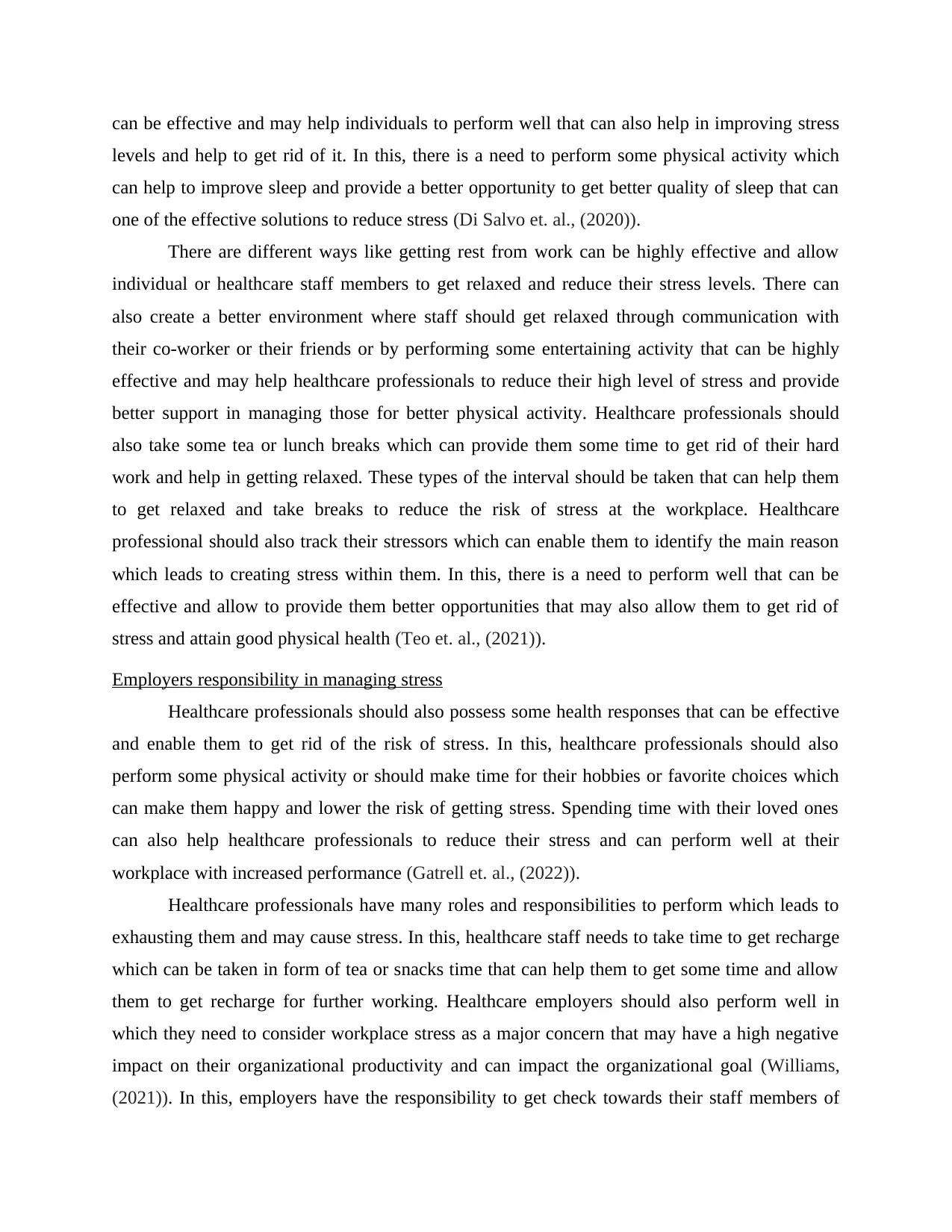
can be effective and may help individuals to perform well that can also help in improving stress
levels and help to get rid of it. In this, there is a need to perform some physical activity which
can help to improve sleep and provide a better opportunity to get better quality of sleep that can
one of the effective solutions to reduce stress (Di Salvo et. al., (2020)).
There are different ways like getting rest from work can be highly effective and allow
individual or healthcare staff members to get relaxed and reduce their stress levels. There can
also create a better environment where staff should get relaxed through communication with
their co-worker or their friends or by performing some entertaining activity that can be highly
effective and may help healthcare professionals to reduce their high level of stress and provide
better support in managing those for better physical activity. Healthcare professionals should
also take some tea or lunch breaks which can provide them some time to get rid of their hard
work and help in getting relaxed. These types of the interval should be taken that can help them
to get relaxed and take breaks to reduce the risk of stress at the workplace. Healthcare
professional should also track their stressors which can enable them to identify the main reason
which leads to creating stress within them. In this, there is a need to perform well that can be
effective and allow to provide them better opportunities that may also allow them to get rid of
stress and attain good physical health (Teo et. al., (2021)).
Employers responsibility in managing stress
Healthcare professionals should also possess some health responses that can be effective
and enable them to get rid of the risk of stress. In this, healthcare professionals should also
perform some physical activity or should make time for their hobbies or favorite choices which
can make them happy and lower the risk of getting stress. Spending time with their loved ones
can also help healthcare professionals to reduce their stress and can perform well at their
workplace with increased performance (Gatrell et. al., (2022)).
Healthcare professionals have many roles and responsibilities to perform which leads to
exhausting them and may cause stress. In this, healthcare staff needs to take time to get recharge
which can be taken in form of tea or snacks time that can help them to get some time and allow
them to get recharge for further working. Healthcare employers should also perform well in
which they need to consider workplace stress as a major concern that may have a high negative
impact on their organizational productivity and can impact the organizational goal (Williams,
(2021)). In this, employers have the responsibility to get check towards their staff members of
levels and help to get rid of it. In this, there is a need to perform some physical activity which
can help to improve sleep and provide a better opportunity to get better quality of sleep that can
one of the effective solutions to reduce stress (Di Salvo et. al., (2020)).
There are different ways like getting rest from work can be highly effective and allow
individual or healthcare staff members to get relaxed and reduce their stress levels. There can
also create a better environment where staff should get relaxed through communication with
their co-worker or their friends or by performing some entertaining activity that can be highly
effective and may help healthcare professionals to reduce their high level of stress and provide
better support in managing those for better physical activity. Healthcare professionals should
also take some tea or lunch breaks which can provide them some time to get rid of their hard
work and help in getting relaxed. These types of the interval should be taken that can help them
to get relaxed and take breaks to reduce the risk of stress at the workplace. Healthcare
professional should also track their stressors which can enable them to identify the main reason
which leads to creating stress within them. In this, there is a need to perform well that can be
effective and allow to provide them better opportunities that may also allow them to get rid of
stress and attain good physical health (Teo et. al., (2021)).
Employers responsibility in managing stress
Healthcare professionals should also possess some health responses that can be effective
and enable them to get rid of the risk of stress. In this, healthcare professionals should also
perform some physical activity or should make time for their hobbies or favorite choices which
can make them happy and lower the risk of getting stress. Spending time with their loved ones
can also help healthcare professionals to reduce their stress and can perform well at their
workplace with increased performance (Gatrell et. al., (2022)).
Healthcare professionals have many roles and responsibilities to perform which leads to
exhausting them and may cause stress. In this, healthcare staff needs to take time to get recharge
which can be taken in form of tea or snacks time that can help them to get some time and allow
them to get recharge for further working. Healthcare employers should also perform well in
which they need to consider workplace stress as a major concern that may have a high negative
impact on their organizational productivity and can impact the organizational goal (Williams,
(2021)). In this, employers have the responsibility to get check towards their staff members of
⊘ This is a preview!⊘
Do you want full access?
Subscribe today to unlock all pages.

Trusted by 1+ million students worldwide
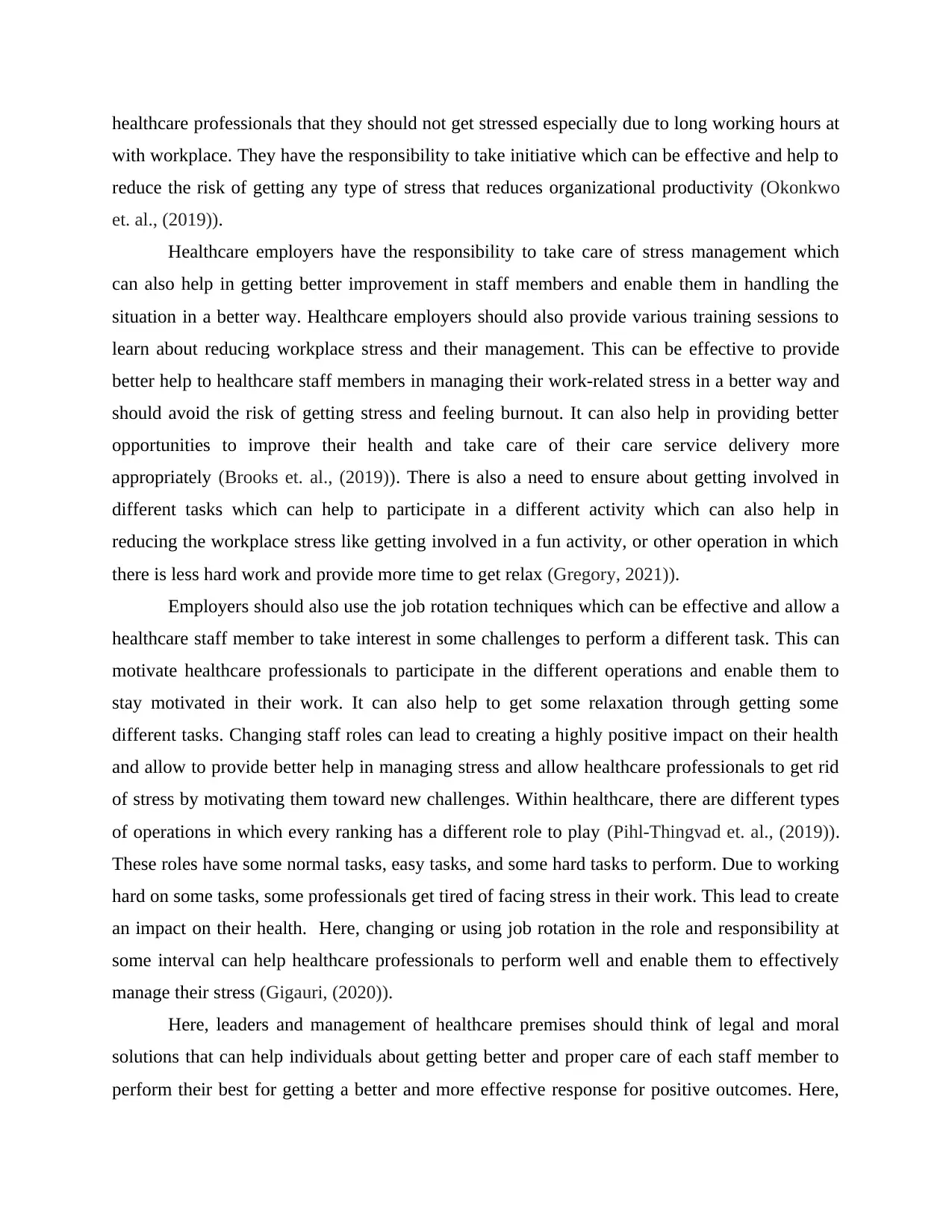
healthcare professionals that they should not get stressed especially due to long working hours at
with workplace. They have the responsibility to take initiative which can be effective and help to
reduce the risk of getting any type of stress that reduces organizational productivity (Okonkwo
et. al., (2019)).
Healthcare employers have the responsibility to take care of stress management which
can also help in getting better improvement in staff members and enable them in handling the
situation in a better way. Healthcare employers should also provide various training sessions to
learn about reducing workplace stress and their management. This can be effective to provide
better help to healthcare staff members in managing their work-related stress in a better way and
should avoid the risk of getting stress and feeling burnout. It can also help in providing better
opportunities to improve their health and take care of their care service delivery more
appropriately (Brooks et. al., (2019)). There is also a need to ensure about getting involved in
different tasks which can help to participate in a different activity which can also help in
reducing the workplace stress like getting involved in a fun activity, or other operation in which
there is less hard work and provide more time to get relax (Gregory, 2021)).
Employers should also use the job rotation techniques which can be effective and allow a
healthcare staff member to take interest in some challenges to perform a different task. This can
motivate healthcare professionals to participate in the different operations and enable them to
stay motivated in their work. It can also help to get some relaxation through getting some
different tasks. Changing staff roles can lead to creating a highly positive impact on their health
and allow to provide better help in managing stress and allow healthcare professionals to get rid
of stress by motivating them toward new challenges. Within healthcare, there are different types
of operations in which every ranking has a different role to play (Pihl-Thingvad et. al., (2019)).
These roles have some normal tasks, easy tasks, and some hard tasks to perform. Due to working
hard on some tasks, some professionals get tired of facing stress in their work. This lead to create
an impact on their health. Here, changing or using job rotation in the role and responsibility at
some interval can help healthcare professionals to perform well and enable them to effectively
manage their stress (Gigauri, (2020)).
Here, leaders and management of healthcare premises should think of legal and moral
solutions that can help individuals about getting better and proper care of each staff member to
perform their best for getting a better and more effective response for positive outcomes. Here,
with workplace. They have the responsibility to take initiative which can be effective and help to
reduce the risk of getting any type of stress that reduces organizational productivity (Okonkwo
et. al., (2019)).
Healthcare employers have the responsibility to take care of stress management which
can also help in getting better improvement in staff members and enable them in handling the
situation in a better way. Healthcare employers should also provide various training sessions to
learn about reducing workplace stress and their management. This can be effective to provide
better help to healthcare staff members in managing their work-related stress in a better way and
should avoid the risk of getting stress and feeling burnout. It can also help in providing better
opportunities to improve their health and take care of their care service delivery more
appropriately (Brooks et. al., (2019)). There is also a need to ensure about getting involved in
different tasks which can help to participate in a different activity which can also help in
reducing the workplace stress like getting involved in a fun activity, or other operation in which
there is less hard work and provide more time to get relax (Gregory, 2021)).
Employers should also use the job rotation techniques which can be effective and allow a
healthcare staff member to take interest in some challenges to perform a different task. This can
motivate healthcare professionals to participate in the different operations and enable them to
stay motivated in their work. It can also help to get some relaxation through getting some
different tasks. Changing staff roles can lead to creating a highly positive impact on their health
and allow to provide better help in managing stress and allow healthcare professionals to get rid
of stress by motivating them toward new challenges. Within healthcare, there are different types
of operations in which every ranking has a different role to play (Pihl-Thingvad et. al., (2019)).
These roles have some normal tasks, easy tasks, and some hard tasks to perform. Due to working
hard on some tasks, some professionals get tired of facing stress in their work. This lead to create
an impact on their health. Here, changing or using job rotation in the role and responsibility at
some interval can help healthcare professionals to perform well and enable them to effectively
manage their stress (Gigauri, (2020)).
Here, leaders and management of healthcare premises should think of legal and moral
solutions that can help individuals about getting better and proper care of each staff member to
perform their best for getting a better and more effective response for positive outcomes. Here,
Paraphrase This Document
Need a fresh take? Get an instant paraphrase of this document with our AI Paraphraser
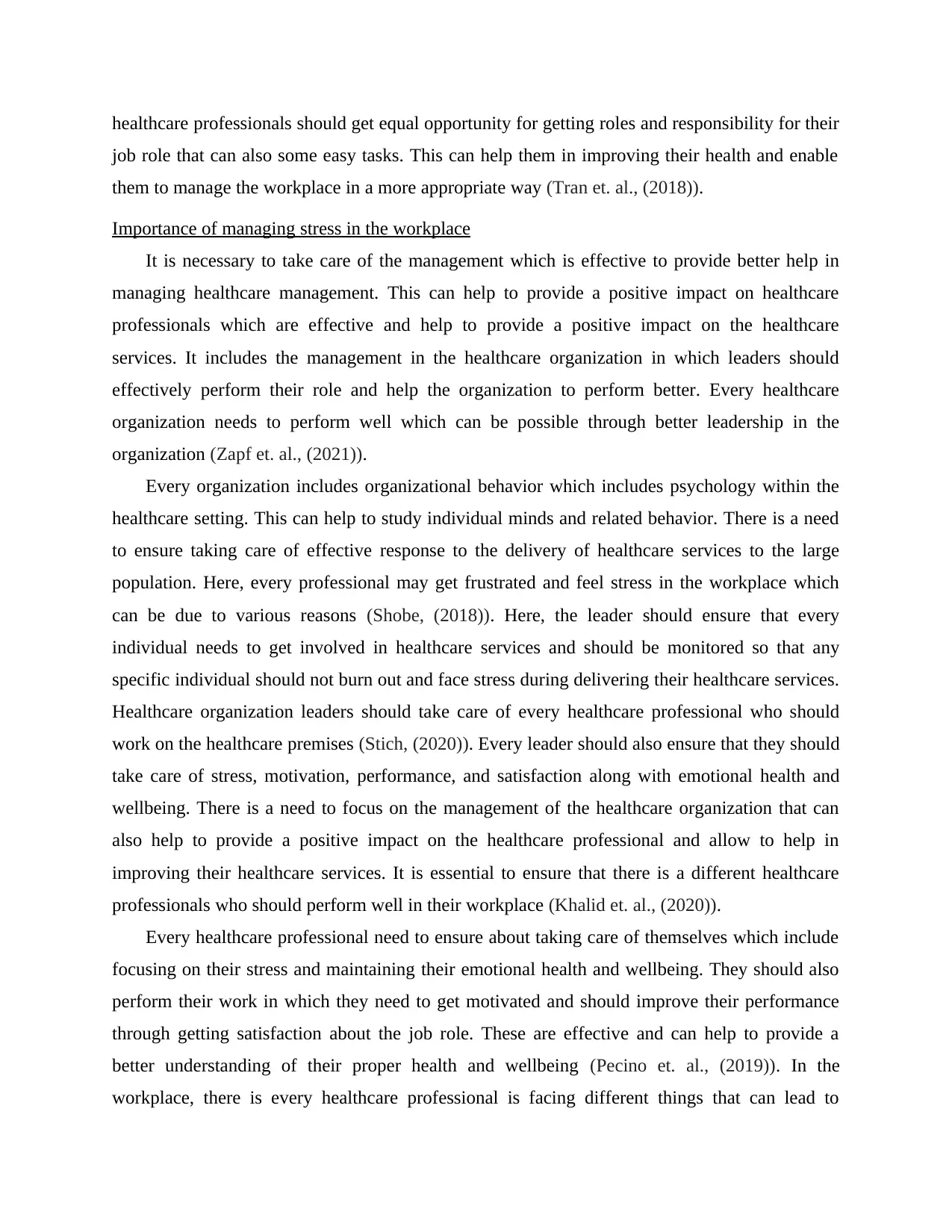
healthcare professionals should get equal opportunity for getting roles and responsibility for their
job role that can also some easy tasks. This can help them in improving their health and enable
them to manage the workplace in a more appropriate way (Tran et. al., (2018)).
Importance of managing stress in the workplace
It is necessary to take care of the management which is effective to provide better help in
managing healthcare management. This can help to provide a positive impact on healthcare
professionals which are effective and help to provide a positive impact on the healthcare
services. It includes the management in the healthcare organization in which leaders should
effectively perform their role and help the organization to perform better. Every healthcare
organization needs to perform well which can be possible through better leadership in the
organization (Zapf et. al., (2021)).
Every organization includes organizational behavior which includes psychology within the
healthcare setting. This can help to study individual minds and related behavior. There is a need
to ensure taking care of effective response to the delivery of healthcare services to the large
population. Here, every professional may get frustrated and feel stress in the workplace which
can be due to various reasons (Shobe, (2018)). Here, the leader should ensure that every
individual needs to get involved in healthcare services and should be monitored so that any
specific individual should not burn out and face stress during delivering their healthcare services.
Healthcare organization leaders should take care of every healthcare professional who should
work on the healthcare premises (Stich, (2020)). Every leader should also ensure that they should
take care of stress, motivation, performance, and satisfaction along with emotional health and
wellbeing. There is a need to focus on the management of the healthcare organization that can
also help to provide a positive impact on the healthcare professional and allow to help in
improving their healthcare services. It is essential to ensure that there is a different healthcare
professionals who should perform well in their workplace (Khalid et. al., (2020)).
Every healthcare professional need to ensure about taking care of themselves which include
focusing on their stress and maintaining their emotional health and wellbeing. They should also
perform their work in which they need to get motivated and should improve their performance
through getting satisfaction about the job role. These are effective and can help to provide a
better understanding of their proper health and wellbeing (Pecino et. al., (2019)). In the
workplace, there is every healthcare professional is facing different things that can lead to
job role that can also some easy tasks. This can help them in improving their health and enable
them to manage the workplace in a more appropriate way (Tran et. al., (2018)).
Importance of managing stress in the workplace
It is necessary to take care of the management which is effective to provide better help in
managing healthcare management. This can help to provide a positive impact on healthcare
professionals which are effective and help to provide a positive impact on the healthcare
services. It includes the management in the healthcare organization in which leaders should
effectively perform their role and help the organization to perform better. Every healthcare
organization needs to perform well which can be possible through better leadership in the
organization (Zapf et. al., (2021)).
Every organization includes organizational behavior which includes psychology within the
healthcare setting. This can help to study individual minds and related behavior. There is a need
to ensure taking care of effective response to the delivery of healthcare services to the large
population. Here, every professional may get frustrated and feel stress in the workplace which
can be due to various reasons (Shobe, (2018)). Here, the leader should ensure that every
individual needs to get involved in healthcare services and should be monitored so that any
specific individual should not burn out and face stress during delivering their healthcare services.
Healthcare organization leaders should take care of every healthcare professional who should
work on the healthcare premises (Stich, (2020)). Every leader should also ensure that they should
take care of stress, motivation, performance, and satisfaction along with emotional health and
wellbeing. There is a need to focus on the management of the healthcare organization that can
also help to provide a positive impact on the healthcare professional and allow to help in
improving their healthcare services. It is essential to ensure that there is a different healthcare
professionals who should perform well in their workplace (Khalid et. al., (2020)).
Every healthcare professional need to ensure about taking care of themselves which include
focusing on their stress and maintaining their emotional health and wellbeing. They should also
perform their work in which they need to get motivated and should improve their performance
through getting satisfaction about the job role. These are effective and can help to provide a
better understanding of their proper health and wellbeing (Pecino et. al., (2019)). In the
workplace, there is every healthcare professional is facing different things that can lead to
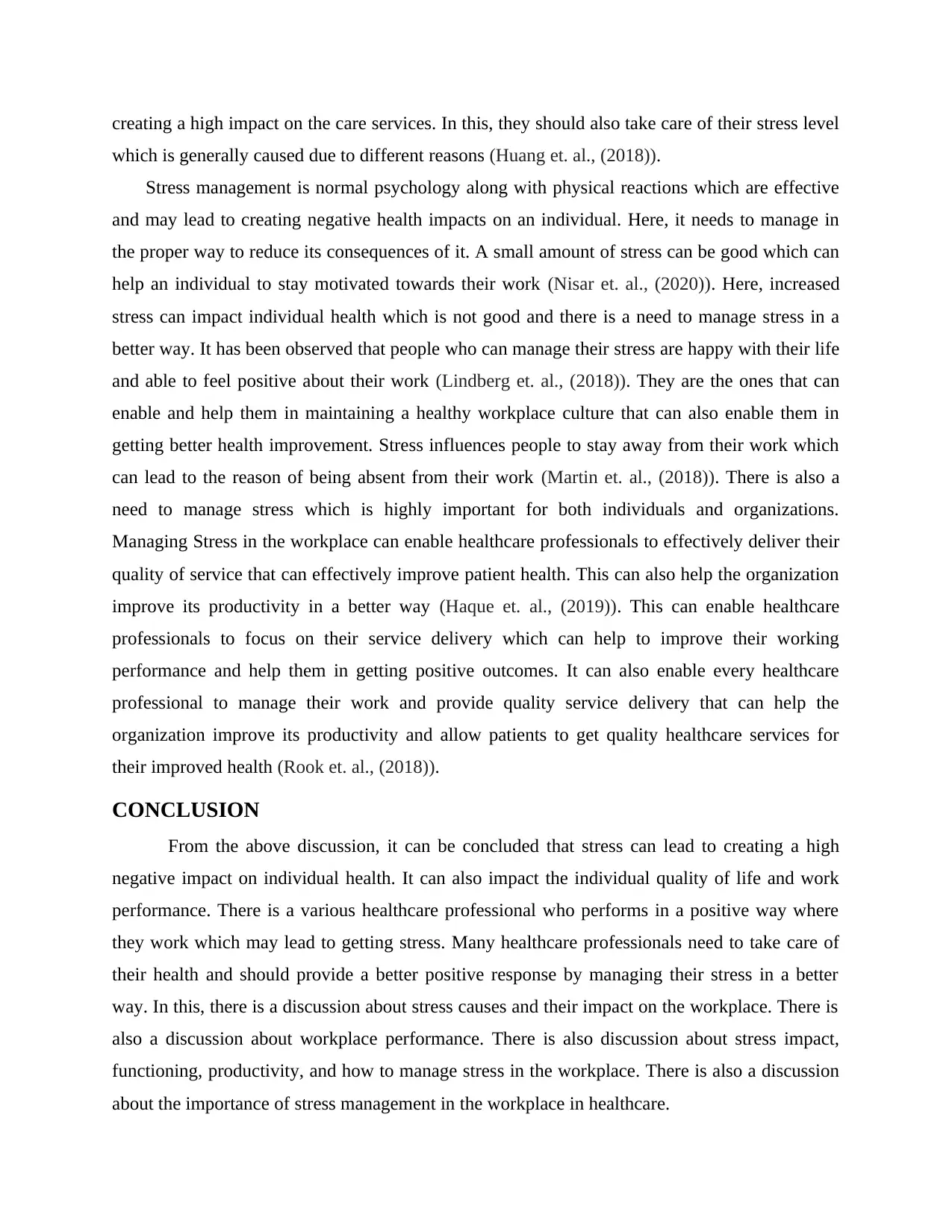
creating a high impact on the care services. In this, they should also take care of their stress level
which is generally caused due to different reasons (Huang et. al., (2018)).
Stress management is normal psychology along with physical reactions which are effective
and may lead to creating negative health impacts on an individual. Here, it needs to manage in
the proper way to reduce its consequences of it. A small amount of stress can be good which can
help an individual to stay motivated towards their work (Nisar et. al., (2020)). Here, increased
stress can impact individual health which is not good and there is a need to manage stress in a
better way. It has been observed that people who can manage their stress are happy with their life
and able to feel positive about their work (Lindberg et. al., (2018)). They are the ones that can
enable and help them in maintaining a healthy workplace culture that can also enable them in
getting better health improvement. Stress influences people to stay away from their work which
can lead to the reason of being absent from their work (Martin et. al., (2018)). There is also a
need to manage stress which is highly important for both individuals and organizations.
Managing Stress in the workplace can enable healthcare professionals to effectively deliver their
quality of service that can effectively improve patient health. This can also help the organization
improve its productivity in a better way (Haque et. al., (2019)). This can enable healthcare
professionals to focus on their service delivery which can help to improve their working
performance and help them in getting positive outcomes. It can also enable every healthcare
professional to manage their work and provide quality service delivery that can help the
organization improve its productivity and allow patients to get quality healthcare services for
their improved health (Rook et. al., (2018)).
CONCLUSION
From the above discussion, it can be concluded that stress can lead to creating a high
negative impact on individual health. It can also impact the individual quality of life and work
performance. There is a various healthcare professional who performs in a positive way where
they work which may lead to getting stress. Many healthcare professionals need to take care of
their health and should provide a better positive response by managing their stress in a better
way. In this, there is a discussion about stress causes and their impact on the workplace. There is
also a discussion about workplace performance. There is also discussion about stress impact,
functioning, productivity, and how to manage stress in the workplace. There is also a discussion
about the importance of stress management in the workplace in healthcare.
which is generally caused due to different reasons (Huang et. al., (2018)).
Stress management is normal psychology along with physical reactions which are effective
and may lead to creating negative health impacts on an individual. Here, it needs to manage in
the proper way to reduce its consequences of it. A small amount of stress can be good which can
help an individual to stay motivated towards their work (Nisar et. al., (2020)). Here, increased
stress can impact individual health which is not good and there is a need to manage stress in a
better way. It has been observed that people who can manage their stress are happy with their life
and able to feel positive about their work (Lindberg et. al., (2018)). They are the ones that can
enable and help them in maintaining a healthy workplace culture that can also enable them in
getting better health improvement. Stress influences people to stay away from their work which
can lead to the reason of being absent from their work (Martin et. al., (2018)). There is also a
need to manage stress which is highly important for both individuals and organizations.
Managing Stress in the workplace can enable healthcare professionals to effectively deliver their
quality of service that can effectively improve patient health. This can also help the organization
improve its productivity in a better way (Haque et. al., (2019)). This can enable healthcare
professionals to focus on their service delivery which can help to improve their working
performance and help them in getting positive outcomes. It can also enable every healthcare
professional to manage their work and provide quality service delivery that can help the
organization improve its productivity and allow patients to get quality healthcare services for
their improved health (Rook et. al., (2018)).
CONCLUSION
From the above discussion, it can be concluded that stress can lead to creating a high
negative impact on individual health. It can also impact the individual quality of life and work
performance. There is a various healthcare professional who performs in a positive way where
they work which may lead to getting stress. Many healthcare professionals need to take care of
their health and should provide a better positive response by managing their stress in a better
way. In this, there is a discussion about stress causes and their impact on the workplace. There is
also a discussion about workplace performance. There is also discussion about stress impact,
functioning, productivity, and how to manage stress in the workplace. There is also a discussion
about the importance of stress management in the workplace in healthcare.
⊘ This is a preview!⊘
Do you want full access?
Subscribe today to unlock all pages.

Trusted by 1+ million students worldwide
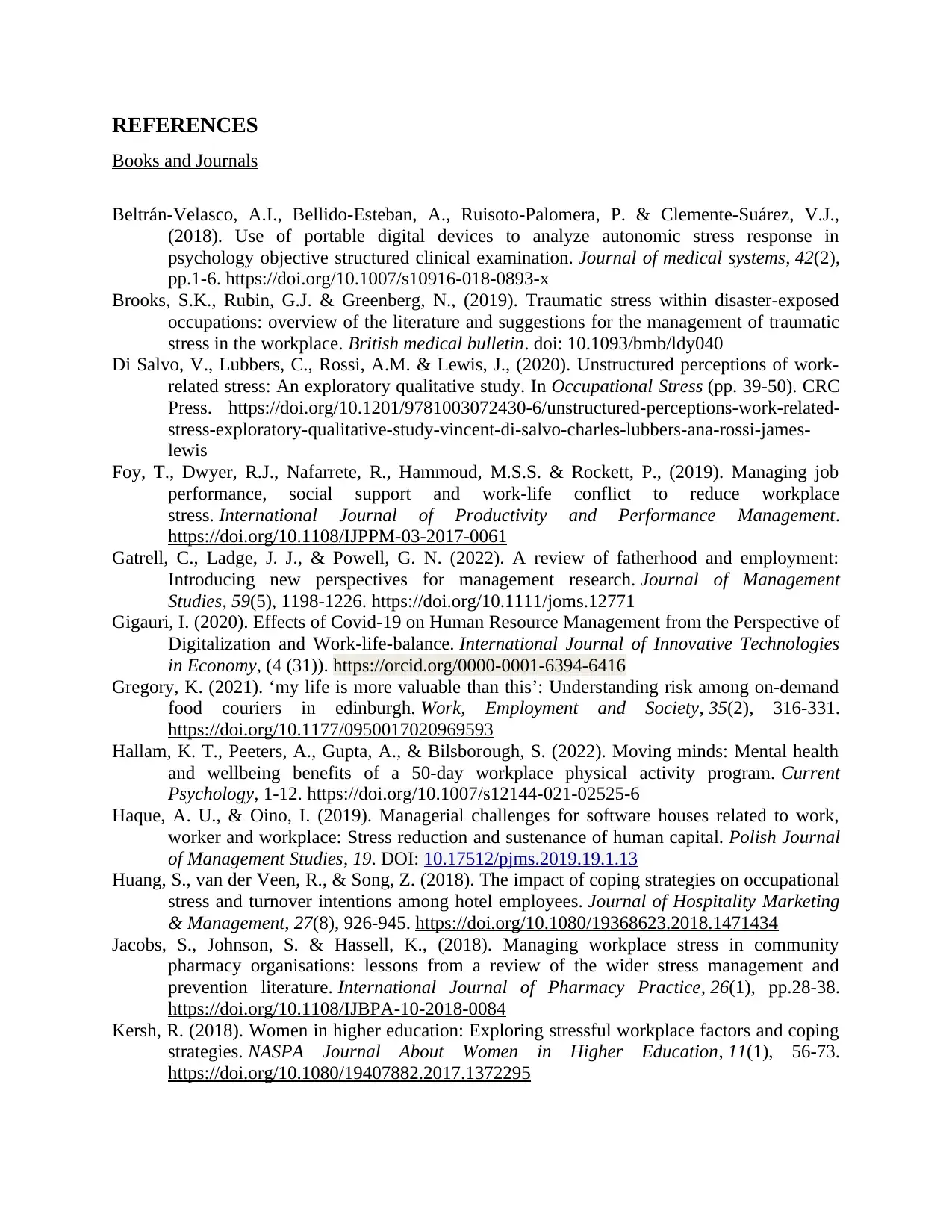
REFERENCES
Books and Journals
Beltrán-Velasco, A.I., Bellido-Esteban, A., Ruisoto-Palomera, P. & Clemente-Suárez, V.J.,
(2018). Use of portable digital devices to analyze autonomic stress response in
psychology objective structured clinical examination. Journal of medical systems, 42(2),
pp.1-6. https://doi.org/10.1007/s10916-018-0893-x
Brooks, S.K., Rubin, G.J. & Greenberg, N., (2019). Traumatic stress within disaster-exposed
occupations: overview of the literature and suggestions for the management of traumatic
stress in the workplace. British medical bulletin. doi: 10.1093/bmb/ldy040
Di Salvo, V., Lubbers, C., Rossi, A.M. & Lewis, J., (2020). Unstructured perceptions of work-
related stress: An exploratory qualitative study. In Occupational Stress (pp. 39-50). CRC
Press. https://doi.org/10.1201/9781003072430-6/unstructured-perceptions-work-related-
stress-exploratory-qualitative-study-vincent-di-salvo-charles-lubbers-ana-rossi-james-
lewis
Foy, T., Dwyer, R.J., Nafarrete, R., Hammoud, M.S.S. & Rockett, P., (2019). Managing job
performance, social support and work-life conflict to reduce workplace
stress. International Journal of Productivity and Performance Management.
https://doi.org/10.1108/IJPPM-03-2017-0061
Gatrell, C., Ladge, J. J., & Powell, G. N. (2022). A review of fatherhood and employment:
Introducing new perspectives for management research. Journal of Management
Studies, 59(5), 1198-1226. https://doi.org/10.1111/joms.12771
Gigauri, I. (2020). Effects of Covid-19 on Human Resource Management from the Perspective of
Digitalization and Work-life-balance. International Journal of Innovative Technologies
in Economy, (4 (31)). https://orcid.org/0000-0001-6394-6416
Gregory, K. (2021). ‘my life is more valuable than this’: Understanding risk among on-demand
food couriers in edinburgh. Work, Employment and Society, 35(2), 316-331.
https://doi.org/10.1177/0950017020969593
Hallam, K. T., Peeters, A., Gupta, A., & Bilsborough, S. (2022). Moving minds: Mental health
and wellbeing benefits of a 50-day workplace physical activity program. Current
Psychology, 1-12. https://doi.org/10.1007/s12144-021-02525-6
Haque, A. U., & Oino, I. (2019). Managerial challenges for software houses related to work,
worker and workplace: Stress reduction and sustenance of human capital. Polish Journal
of Management Studies, 19. DOI: 10.17512/pjms.2019.19.1.13
Huang, S., van der Veen, R., & Song, Z. (2018). The impact of coping strategies on occupational
stress and turnover intentions among hotel employees. Journal of Hospitality Marketing
& Management, 27(8), 926-945. https://doi.org/10.1080/19368623.2018.1471434
Jacobs, S., Johnson, S. & Hassell, K., (2018). Managing workplace stress in community
pharmacy organisations: lessons from a review of the wider stress management and
prevention literature. International Journal of Pharmacy Practice, 26(1), pp.28-38.
https://doi.org/10.1108/IJBPA-10-2018-0084
Kersh, R. (2018). Women in higher education: Exploring stressful workplace factors and coping
strategies. NASPA Journal About Women in Higher Education, 11(1), 56-73.
https://doi.org/10.1080/19407882.2017.1372295
Books and Journals
Beltrán-Velasco, A.I., Bellido-Esteban, A., Ruisoto-Palomera, P. & Clemente-Suárez, V.J.,
(2018). Use of portable digital devices to analyze autonomic stress response in
psychology objective structured clinical examination. Journal of medical systems, 42(2),
pp.1-6. https://doi.org/10.1007/s10916-018-0893-x
Brooks, S.K., Rubin, G.J. & Greenberg, N., (2019). Traumatic stress within disaster-exposed
occupations: overview of the literature and suggestions for the management of traumatic
stress in the workplace. British medical bulletin. doi: 10.1093/bmb/ldy040
Di Salvo, V., Lubbers, C., Rossi, A.M. & Lewis, J., (2020). Unstructured perceptions of work-
related stress: An exploratory qualitative study. In Occupational Stress (pp. 39-50). CRC
Press. https://doi.org/10.1201/9781003072430-6/unstructured-perceptions-work-related-
stress-exploratory-qualitative-study-vincent-di-salvo-charles-lubbers-ana-rossi-james-
lewis
Foy, T., Dwyer, R.J., Nafarrete, R., Hammoud, M.S.S. & Rockett, P., (2019). Managing job
performance, social support and work-life conflict to reduce workplace
stress. International Journal of Productivity and Performance Management.
https://doi.org/10.1108/IJPPM-03-2017-0061
Gatrell, C., Ladge, J. J., & Powell, G. N. (2022). A review of fatherhood and employment:
Introducing new perspectives for management research. Journal of Management
Studies, 59(5), 1198-1226. https://doi.org/10.1111/joms.12771
Gigauri, I. (2020). Effects of Covid-19 on Human Resource Management from the Perspective of
Digitalization and Work-life-balance. International Journal of Innovative Technologies
in Economy, (4 (31)). https://orcid.org/0000-0001-6394-6416
Gregory, K. (2021). ‘my life is more valuable than this’: Understanding risk among on-demand
food couriers in edinburgh. Work, Employment and Society, 35(2), 316-331.
https://doi.org/10.1177/0950017020969593
Hallam, K. T., Peeters, A., Gupta, A., & Bilsborough, S. (2022). Moving minds: Mental health
and wellbeing benefits of a 50-day workplace physical activity program. Current
Psychology, 1-12. https://doi.org/10.1007/s12144-021-02525-6
Haque, A. U., & Oino, I. (2019). Managerial challenges for software houses related to work,
worker and workplace: Stress reduction and sustenance of human capital. Polish Journal
of Management Studies, 19. DOI: 10.17512/pjms.2019.19.1.13
Huang, S., van der Veen, R., & Song, Z. (2018). The impact of coping strategies on occupational
stress and turnover intentions among hotel employees. Journal of Hospitality Marketing
& Management, 27(8), 926-945. https://doi.org/10.1080/19368623.2018.1471434
Jacobs, S., Johnson, S. & Hassell, K., (2018). Managing workplace stress in community
pharmacy organisations: lessons from a review of the wider stress management and
prevention literature. International Journal of Pharmacy Practice, 26(1), pp.28-38.
https://doi.org/10.1108/IJBPA-10-2018-0084
Kersh, R. (2018). Women in higher education: Exploring stressful workplace factors and coping
strategies. NASPA Journal About Women in Higher Education, 11(1), 56-73.
https://doi.org/10.1080/19407882.2017.1372295
Paraphrase This Document
Need a fresh take? Get an instant paraphrase of this document with our AI Paraphraser
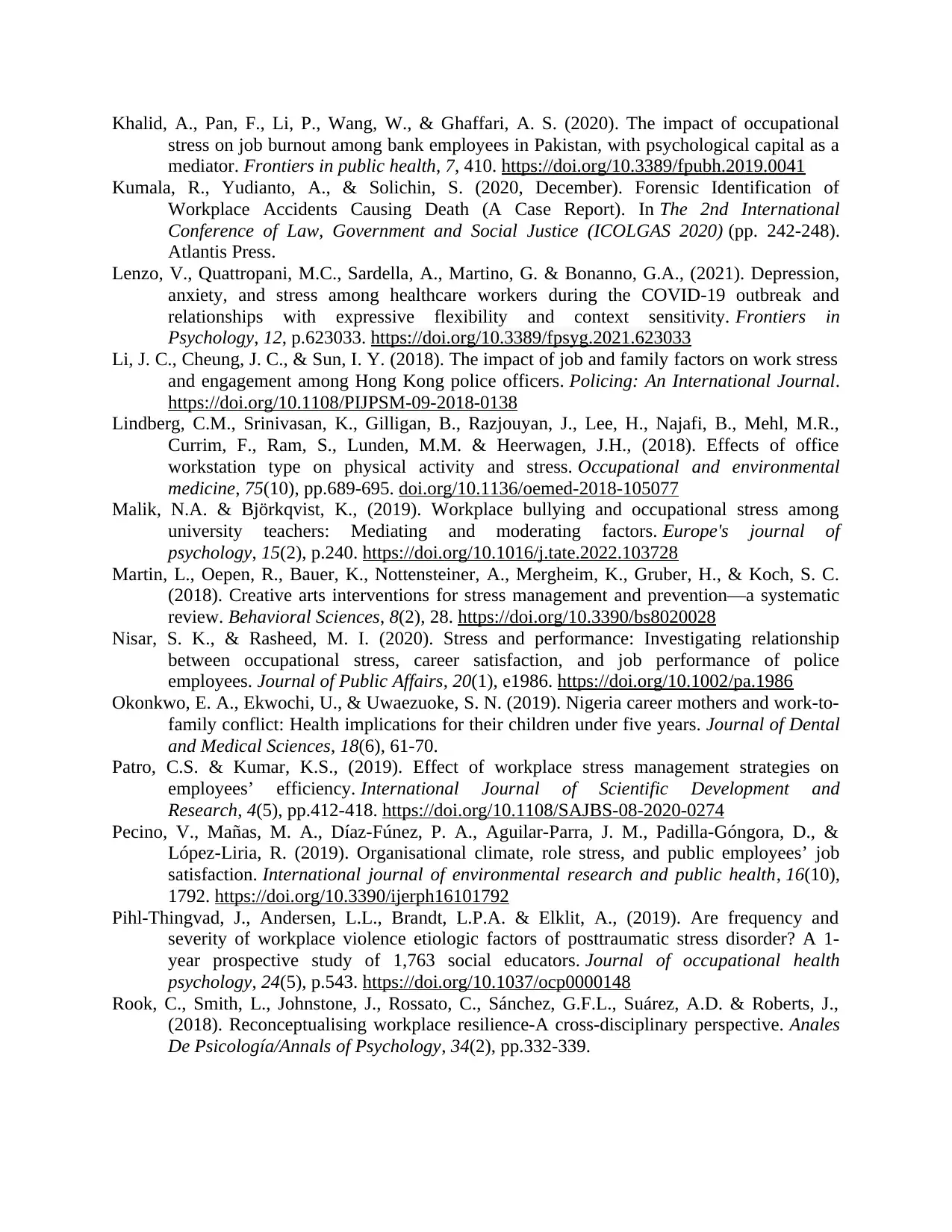
Khalid, A., Pan, F., Li, P., Wang, W., & Ghaffari, A. S. (2020). The impact of occupational
stress on job burnout among bank employees in Pakistan, with psychological capital as a
mediator. Frontiers in public health, 7, 410. https://doi.org/10.3389/fpubh.2019.0041
Kumala, R., Yudianto, A., & Solichin, S. (2020, December). Forensic Identification of
Workplace Accidents Causing Death (A Case Report). In The 2nd International
Conference of Law, Government and Social Justice (ICOLGAS 2020) (pp. 242-248).
Atlantis Press.
Lenzo, V., Quattropani, M.C., Sardella, A., Martino, G. & Bonanno, G.A., (2021). Depression,
anxiety, and stress among healthcare workers during the COVID-19 outbreak and
relationships with expressive flexibility and context sensitivity. Frontiers in
Psychology, 12, p.623033. https://doi.org/10.3389/fpsyg.2021.623033
Li, J. C., Cheung, J. C., & Sun, I. Y. (2018). The impact of job and family factors on work stress
and engagement among Hong Kong police officers. Policing: An International Journal.
https://doi.org/10.1108/PIJPSM-09-2018-0138
Lindberg, C.M., Srinivasan, K., Gilligan, B., Razjouyan, J., Lee, H., Najafi, B., Mehl, M.R.,
Currim, F., Ram, S., Lunden, M.M. & Heerwagen, J.H., (2018). Effects of office
workstation type on physical activity and stress. Occupational and environmental
medicine, 75(10), pp.689-695. doi.org/10.1136/oemed-2018-105077
Malik, N.A. & Björkqvist, K., (2019). Workplace bullying and occupational stress among
university teachers: Mediating and moderating factors. Europe's journal of
psychology, 15(2), p.240. https://doi.org/10.1016/j.tate.2022.103728
Martin, L., Oepen, R., Bauer, K., Nottensteiner, A., Mergheim, K., Gruber, H., & Koch, S. C.
(2018). Creative arts interventions for stress management and prevention—a systematic
review. Behavioral Sciences, 8(2), 28. https://doi.org/10.3390/bs8020028
Nisar, S. K., & Rasheed, M. I. (2020). Stress and performance: Investigating relationship
between occupational stress, career satisfaction, and job performance of police
employees. Journal of Public Affairs, 20(1), e1986. https://doi.org/10.1002/pa.1986
Okonkwo, E. A., Ekwochi, U., & Uwaezuoke, S. N. (2019). Nigeria career mothers and work-to-
family conflict: Health implications for their children under five years. Journal of Dental
and Medical Sciences, 18(6), 61-70.
Patro, C.S. & Kumar, K.S., (2019). Effect of workplace stress management strategies on
employees’ efficiency. International Journal of Scientific Development and
Research, 4(5), pp.412-418. https://doi.org/10.1108/SAJBS-08-2020-0274
Pecino, V., Mañas, M. A., Díaz-Fúnez, P. A., Aguilar-Parra, J. M., Padilla-Góngora, D., &
López-Liria, R. (2019). Organisational climate, role stress, and public employees’ job
satisfaction. International journal of environmental research and public health, 16(10),
1792. https://doi.org/10.3390/ijerph16101792
Pihl-Thingvad, J., Andersen, L.L., Brandt, L.P.A. & Elklit, A., (2019). Are frequency and
severity of workplace violence etiologic factors of posttraumatic stress disorder? A 1-
year prospective study of 1,763 social educators. Journal of occupational health
psychology, 24(5), p.543. https://doi.org/10.1037/ocp0000148
Rook, C., Smith, L., Johnstone, J., Rossato, C., Sánchez, G.F.L., Suárez, A.D. & Roberts, J.,
(2018). Reconceptualising workplace resilience-A cross-disciplinary perspective. Anales
De Psicología/Annals of Psychology, 34(2), pp.332-339.
stress on job burnout among bank employees in Pakistan, with psychological capital as a
mediator. Frontiers in public health, 7, 410. https://doi.org/10.3389/fpubh.2019.0041
Kumala, R., Yudianto, A., & Solichin, S. (2020, December). Forensic Identification of
Workplace Accidents Causing Death (A Case Report). In The 2nd International
Conference of Law, Government and Social Justice (ICOLGAS 2020) (pp. 242-248).
Atlantis Press.
Lenzo, V., Quattropani, M.C., Sardella, A., Martino, G. & Bonanno, G.A., (2021). Depression,
anxiety, and stress among healthcare workers during the COVID-19 outbreak and
relationships with expressive flexibility and context sensitivity. Frontiers in
Psychology, 12, p.623033. https://doi.org/10.3389/fpsyg.2021.623033
Li, J. C., Cheung, J. C., & Sun, I. Y. (2018). The impact of job and family factors on work stress
and engagement among Hong Kong police officers. Policing: An International Journal.
https://doi.org/10.1108/PIJPSM-09-2018-0138
Lindberg, C.M., Srinivasan, K., Gilligan, B., Razjouyan, J., Lee, H., Najafi, B., Mehl, M.R.,
Currim, F., Ram, S., Lunden, M.M. & Heerwagen, J.H., (2018). Effects of office
workstation type on physical activity and stress. Occupational and environmental
medicine, 75(10), pp.689-695. doi.org/10.1136/oemed-2018-105077
Malik, N.A. & Björkqvist, K., (2019). Workplace bullying and occupational stress among
university teachers: Mediating and moderating factors. Europe's journal of
psychology, 15(2), p.240. https://doi.org/10.1016/j.tate.2022.103728
Martin, L., Oepen, R., Bauer, K., Nottensteiner, A., Mergheim, K., Gruber, H., & Koch, S. C.
(2018). Creative arts interventions for stress management and prevention—a systematic
review. Behavioral Sciences, 8(2), 28. https://doi.org/10.3390/bs8020028
Nisar, S. K., & Rasheed, M. I. (2020). Stress and performance: Investigating relationship
between occupational stress, career satisfaction, and job performance of police
employees. Journal of Public Affairs, 20(1), e1986. https://doi.org/10.1002/pa.1986
Okonkwo, E. A., Ekwochi, U., & Uwaezuoke, S. N. (2019). Nigeria career mothers and work-to-
family conflict: Health implications for their children under five years. Journal of Dental
and Medical Sciences, 18(6), 61-70.
Patro, C.S. & Kumar, K.S., (2019). Effect of workplace stress management strategies on
employees’ efficiency. International Journal of Scientific Development and
Research, 4(5), pp.412-418. https://doi.org/10.1108/SAJBS-08-2020-0274
Pecino, V., Mañas, M. A., Díaz-Fúnez, P. A., Aguilar-Parra, J. M., Padilla-Góngora, D., &
López-Liria, R. (2019). Organisational climate, role stress, and public employees’ job
satisfaction. International journal of environmental research and public health, 16(10),
1792. https://doi.org/10.3390/ijerph16101792
Pihl-Thingvad, J., Andersen, L.L., Brandt, L.P.A. & Elklit, A., (2019). Are frequency and
severity of workplace violence etiologic factors of posttraumatic stress disorder? A 1-
year prospective study of 1,763 social educators. Journal of occupational health
psychology, 24(5), p.543. https://doi.org/10.1037/ocp0000148
Rook, C., Smith, L., Johnstone, J., Rossato, C., Sánchez, G.F.L., Suárez, A.D. & Roberts, J.,
(2018). Reconceptualising workplace resilience-A cross-disciplinary perspective. Anales
De Psicología/Annals of Psychology, 34(2), pp.332-339.
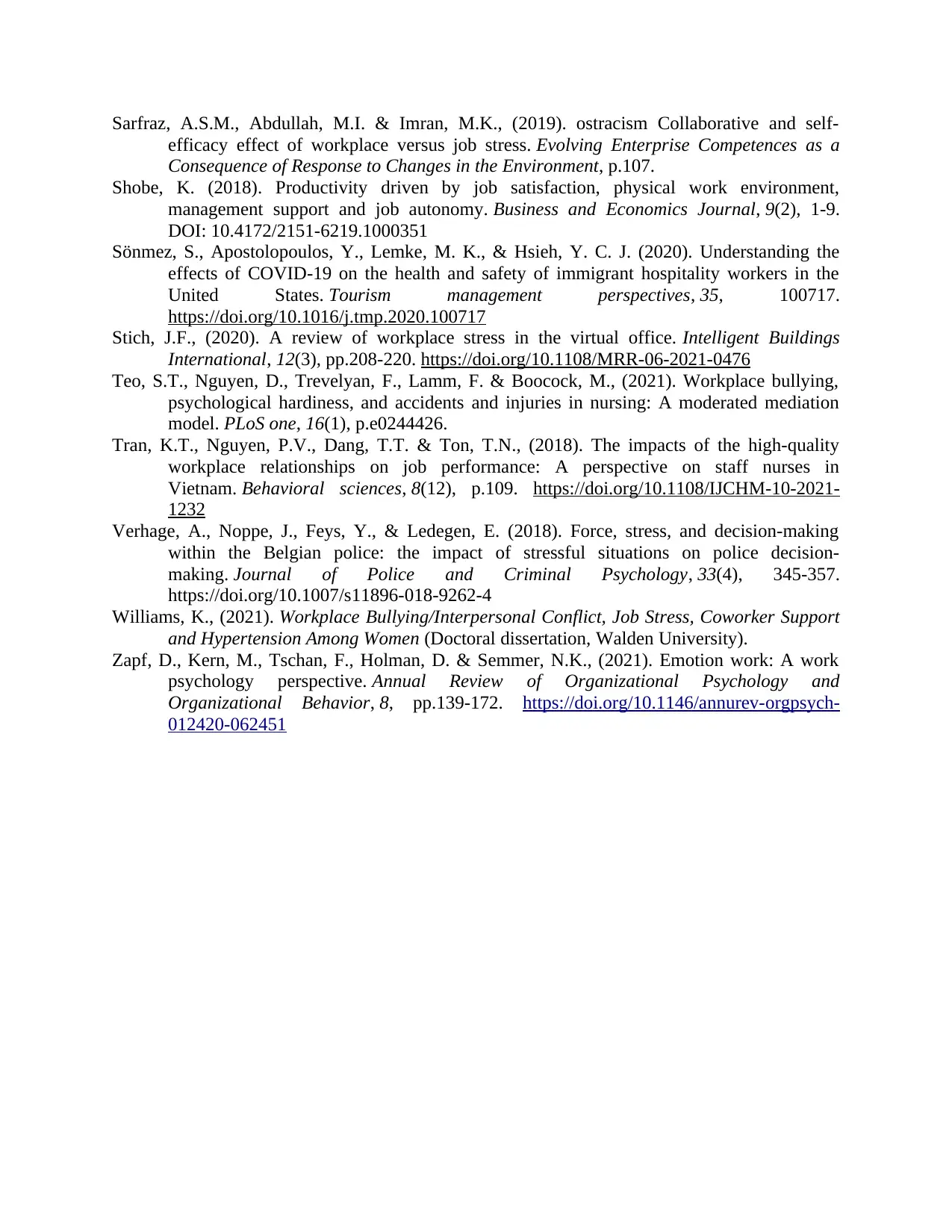
Sarfraz, A.S.M., Abdullah, M.I. & Imran, M.K., (2019). ostracism Collaborative and self-
efficacy effect of workplace versus job stress. Evolving Enterprise Competences as a
Consequence of Response to Changes in the Environment, p.107.
Shobe, K. (2018). Productivity driven by job satisfaction, physical work environment,
management support and job autonomy. Business and Economics Journal, 9(2), 1-9.
DOI: 10.4172/2151-6219.1000351
Sönmez, S., Apostolopoulos, Y., Lemke, M. K., & Hsieh, Y. C. J. (2020). Understanding the
effects of COVID-19 on the health and safety of immigrant hospitality workers in the
United States. Tourism management perspectives, 35, 100717.
https://doi.org/10.1016/j.tmp.2020.100717
Stich, J.F., (2020). A review of workplace stress in the virtual office. Intelligent Buildings
International, 12(3), pp.208-220. https://doi.org/10.1108/MRR-06-2021-0476
Teo, S.T., Nguyen, D., Trevelyan, F., Lamm, F. & Boocock, M., (2021). Workplace bullying,
psychological hardiness, and accidents and injuries in nursing: A moderated mediation
model. PLoS one, 16(1), p.e0244426.
Tran, K.T., Nguyen, P.V., Dang, T.T. & Ton, T.N., (2018). The impacts of the high-quality
workplace relationships on job performance: A perspective on staff nurses in
Vietnam. Behavioral sciences, 8(12), p.109. https://doi.org/10.1108/IJCHM-10-2021-
1232
Verhage, A., Noppe, J., Feys, Y., & Ledegen, E. (2018). Force, stress, and decision-making
within the Belgian police: the impact of stressful situations on police decision-
making. Journal of Police and Criminal Psychology, 33(4), 345-357.
https://doi.org/10.1007/s11896-018-9262-4
Williams, K., (2021). Workplace Bullying/Interpersonal Conflict, Job Stress, Coworker Support
and Hypertension Among Women (Doctoral dissertation, Walden University).
Zapf, D., Kern, M., Tschan, F., Holman, D. & Semmer, N.K., (2021). Emotion work: A work
psychology perspective. Annual Review of Organizational Psychology and
Organizational Behavior, 8, pp.139-172. https://doi.org/10.1146/annurev-orgpsych-
012420-062451
efficacy effect of workplace versus job stress. Evolving Enterprise Competences as a
Consequence of Response to Changes in the Environment, p.107.
Shobe, K. (2018). Productivity driven by job satisfaction, physical work environment,
management support and job autonomy. Business and Economics Journal, 9(2), 1-9.
DOI: 10.4172/2151-6219.1000351
Sönmez, S., Apostolopoulos, Y., Lemke, M. K., & Hsieh, Y. C. J. (2020). Understanding the
effects of COVID-19 on the health and safety of immigrant hospitality workers in the
United States. Tourism management perspectives, 35, 100717.
https://doi.org/10.1016/j.tmp.2020.100717
Stich, J.F., (2020). A review of workplace stress in the virtual office. Intelligent Buildings
International, 12(3), pp.208-220. https://doi.org/10.1108/MRR-06-2021-0476
Teo, S.T., Nguyen, D., Trevelyan, F., Lamm, F. & Boocock, M., (2021). Workplace bullying,
psychological hardiness, and accidents and injuries in nursing: A moderated mediation
model. PLoS one, 16(1), p.e0244426.
Tran, K.T., Nguyen, P.V., Dang, T.T. & Ton, T.N., (2018). The impacts of the high-quality
workplace relationships on job performance: A perspective on staff nurses in
Vietnam. Behavioral sciences, 8(12), p.109. https://doi.org/10.1108/IJCHM-10-2021-
1232
Verhage, A., Noppe, J., Feys, Y., & Ledegen, E. (2018). Force, stress, and decision-making
within the Belgian police: the impact of stressful situations on police decision-
making. Journal of Police and Criminal Psychology, 33(4), 345-357.
https://doi.org/10.1007/s11896-018-9262-4
Williams, K., (2021). Workplace Bullying/Interpersonal Conflict, Job Stress, Coworker Support
and Hypertension Among Women (Doctoral dissertation, Walden University).
Zapf, D., Kern, M., Tschan, F., Holman, D. & Semmer, N.K., (2021). Emotion work: A work
psychology perspective. Annual Review of Organizational Psychology and
Organizational Behavior, 8, pp.139-172. https://doi.org/10.1146/annurev-orgpsych-
012420-062451
⊘ This is a preview!⊘
Do you want full access?
Subscribe today to unlock all pages.

Trusted by 1+ million students worldwide
1 out of 12
Related Documents
Your All-in-One AI-Powered Toolkit for Academic Success.
+13062052269
info@desklib.com
Available 24*7 on WhatsApp / Email
![[object Object]](/_next/static/media/star-bottom.7253800d.svg)
Unlock your academic potential
Copyright © 2020–2026 A2Z Services. All Rights Reserved. Developed and managed by ZUCOL.





